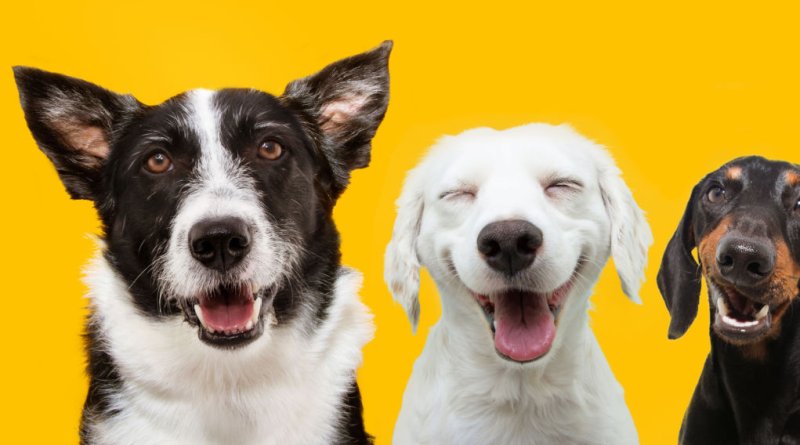What are Dog Personality Traits and Types? – Top Dog Tips
Like people, your pet has different dog personality types that make them different from others.
They can be in a form of dog temperament that’s innate in their breed. In most cases, however, it’s your pooch’s environment that nurtures specific dog personality traits.
From their body language alone, you can tell when they are happy, sad, fearful, or even scared. They act and show behaviors that resemble an actual human!
So what are dog personality traits? If you are looking for answers to this question, then this article is for you!
What are Dog Personality Traits?
Simply put, personality traits are specific characteristics of a dog concerning behaviors.
The presence or absence of these characteristics in a dog dictates how the dog perceives its surroundings or reacts to people.
So if your dog is lacking in sociability, your dog will most probably prefer its own company over others. Similarly, if your dog is playful, it’ll need a large space where it can roam around and play.
In theory, we have five areas to measure when it comes to dog personality traits. These are sociability, playfulness, chase-proneness, curiosity, and aggressiveness.
These are aspects are similar to that of human’s five dimensions of personality: extraversion, agreeableness, openness, conscientiousness, and neuroticism.
Understanding these aspects will give you an idea of where your pet falls into dog personality types.
Sociability
Sociability is the dog’s ability to interact. It also refers to your dog’s tolerance level towards socializing.
In humans, this metric is synonymous with introversion and extroversion. An extroverted individual will tolerate more social interactions while introverts do otherwise.
We measure dogs’ sociability through their tolerance level and their reactions to interacting with people.
You can almost instantly observe if they prefer a large crowd of people or if they’re fine on their own.
Sociability can also refer to interactions with other dogs and even creatures as well.
If your pet dog is sociable, it’ll have no trouble fitting in with other dogs. On the other hand, if it’s lacking sociability, you may find your dog behaving negatively.
Despite having various levels of social tolerance, dogs don’t necessarily have a fixed behavior in different social instances.
For example, not all dogs will snarl at a sight of a stranger. Some will retreat behind you for cover while others will run and avoid the new face.
In the same manner, a social dog doesn’t necessarily mean that it will need your constant head pats and cuddles.
Some dogs with social aptitude will cooperate, and others will even lead the group in the pack.
Playfulness
As the name suggests, playfulness is the tendency of your dogs to play. Playfulness also means how likely your dog is to create bonds and share empathy.
When your dog likes to play, they interact closely with their playmates and thereby strengthening their bonds. This relationship, in turn, creates a sense of trust and loyalty in dogs.
Think of it as a trait that’s synonymous with the agreeableness trait of humans, which is the trait that’s associated with trust, kindness, and affection.
Because of the bonds formed, playful dogs tend to be more empathetic than most dogs, making them great companion pets to have. They are more cooperative and easy to handle.
On the other hand, if a dog is not playful, it becomes aloof and slightly apathetic toward its owners. They’ll have a hard time responding to your stimuli and even commands.
Chase-Proneness
Chase-proneness is one of the dog personality traits concerning susceptibility to chase an object or a creature.
This specific dog personality trait is mostly associated with predatory instincts that go all the way back before dog domestication.
Those were the times when dogs were great hunters that chased their prey in the wild.
Nowadays, chase-proneness refers to responding to stimuli and tendencies.
So, if your dog is not prone to chase around objects in the house, your pet likely has good control of its impulses. This personal trait is equivalent to that of human conscientiousness.
Curiosity
Do you have a dog that is fascinated by its surroundings? Does your dog like to roam around the vicinity?
Is your dog prone to chase stimuli other than your own?
Chances are, your dog is inclined to be curious!
Curiosity is a personality trait that pertains to gaining insights, opening all senses, and reacting to stimuli.
It can also pertain to a dog’s boldness, a personality trait that’s not scared of the unknown.
Often than not, people mistakenly interchange the curiosity trait with chase-proneness. But there’s a hard distinction between the two.
A dog that often runs after things is prone to chase everything simply out of impulse and pure instinct!
Curious dogs can have good control of their impulse but will still follow a stimulus.
But unlike instinct-induced dogs, they are far more independent and intelligent thinkers that react to stimuli because they want to.
Aggressiveness
Like angry human traits, aggressiveness is a dog personality associated with overwhelming behaviors. Some of them are exaggerated and can outright harm someone.
Behaviors that spawn from aggressive dogs mirror that of human neuroticism traits. These behaviors are mostly emotionally unstable, anxiety-driven, and frequently irritated.
You can also look at aggressiveness as a response instead of only looking at it as a trait.
Think of aggressiveness as a response if a dog is agitated or has trouble socializing with its fellow dogs.
They may bark, snarl, growl, and even bite if they are scared, or they are anxious about their environment.
What are Dog Personality Types?
Now that we’ve talked about what dog personality traits are, you should also know what dog personality types are and how these two differ.
While dog personality traits are characteristics, personality types are categories that exhibit a certain set of personality traits.
Think of it like a Myers-Briggs indicator where each individual falls under specific personality types.
Dog personalities are also synonymous with dog temperament.
Overall, your dog can have one of five general dog personality types. Understanding what personality type your dog has can give you better means of taking good care of your dog.
Confident Dog Personality
A confident dog always imposes assertive and dominating tendencies toward people, their surroundings, and other dogs as well.
They often showcase high self-esteem through body language, such as standing straight, with pointed ears, and with heads held up high.
Confident dogs will show dominating behaviors such as climbing to higher ground and excessive guarding of territories, toys, and food.
They have large body build and high energy levels, which is typical across most dog breeds with a confident personality.
These physical traits help them maintain composure when up against danger or an authority figure.
When it comes to handling confident dogs, you should establish trust with them while becoming an authority that they’ll look up to.
Being cautious with dog handling and training through positive reinforcements helps you achieve just that.
When trained well, confident dogs become one of the most loyal and hardworking dogs among any other dog trait type.
Because of these traits, a confident dog functions best as a working dog, such as in the police force or in herding duties.
And while confident dogs are loyal pets, they’re not suited for first-time owners with no dog training experience.
The potential breeds that people most commonly associate with these dog breed personalities are:
- German Shepherd
- Belgian Malinois
- Giant Schnauzer
- English Mastiff
- Dogo Argentino
- Dutch Sheperd
- Doberman Pinscher
- Alano Español
- Irish Terrier
- Anatolian Shepherd
Laidback Dog Personality
A laidback dog possesses traits that are amiable and happy-go-lucky toward people.
They showcase calm and worry-free body language, such as mouth hanging open, slow wagging of the tail, and soft squinting eyes.
The size of laidback dogs varies per dog breed, ranging from gentle giants to dwarf breeds.
Many owners associate laidback dogs with laziness. This is because laidback dogs are low-energy creatures that would prefer napping all day.
They also prefer walking instead of running, which is what most dogs do. Despite the droopy characteristics, laidback dogs are friendly with their owners and great with people of all ages.
If you want to keep a laidback dog, you need to know that these dogs will not be as athletic as most outdoor dogs are.
Nevertheless, you should still require your pet their a minimum amount of daily exercise. You should also monitor their nutrition as their lazy lifestyle can make your dog fat and unhealthy.
Laidback dogs are also social dogs that would need a decent amount of interaction from people and other dogs.
The potential breeds that people most commonly associate with these dog breed personalities are:
- St. Bernard
- Pug
- Basset Hound
- Pekingese
- Havanese
- Greyhounds
- Bernese Mountain Dog
Independent Dog Personality
If your dog is aloof and inquisitive, chances are, your dog has an independent personality.
Independent dogs display curiosity in their body language starting with their wide eyes, nose pointing, and even dog purrs.
Independent dogs are generally curious regardless of how energetic they can be.
High-spirited dogs will mostly roam the backyard and scratch the ground. They’re also susceptible to overstimulation which could easily distract them.
Low-energy independent dogs, on the other hand, are calm, alert, and seemingly less enthusiastic. They’ll tend to ignore things that don’t pique their interest.
Because of these traits, independent dogs make good companions for owners who want low-maintenance pets.
After all, these dogs won’t require your constant love and attention all the time.
When tending to independent dogs, it’s best to leave them to their own devices rather than forcing interactions and social situations.
These dogs are self-assured and smart enough to enjoy their surroundings and their own company.
Training these dogs, however, is difficult as they’ll act only on things that interest them. So if it deemed you’re uninteresting, it won’t budge at all.
The potential breeds that people most commonly associate with these dog breed personalities are:
- Akita Inu
- Polish Lowland Sheepdog
- Brussels Griffon
- Chow Chow
- Airedale Terrier
- Yorkshire Terrier
RELATED: 20 HARDEST TO TRAIN DOGS (BASED ON STUDIES)
Timid Dog Personality
When your dog possesses a timid personality, they live in insecurity, anxiety, and a lack of social exposure.
The timidity reflects in the body language of the dog: constant yawning, aggressive growls, and even frequent panting.
Unlike confident dogs, timid dogs usually meet their fears with an immediate fight-or-flight response.
Because they lack self-esteem, they easily get agitated and aggressive towards their fear factor.
On the other side, a timid dog may also cower behind their owners as a form of flight response.
What your timid dogs need is building confidence and self-assurance, proper conditioning and training do just that.
An anxious dog in training, however, is prone to attention diversion or completely breaking down.
When this happens, your course of action is to completely remove the target trigger first before resuming the training.
It also helps to expose your pet to the trigger gradually at your dog’s pace. This exercise is similar to how a dog gets used to a stranger’s presence.
Be patient at producing progress with the training and make your dog’s confidence larger than their anxieties.
The potential breeds that people most commonly associate with these dog breed personalities are:
- Papillon
- Shih Tzu
- Pomeranian
- Dalmatian
- Chihuahua
- Great Dane
- Chinese Crested Dog
Outgoing Dog Personality
An outgoing personality is the most affable type across all dogs.
Outgoing dogs display submissiveness in their behaviors. They frequently display body language, like stretching their front while lifting their butt and rolling on their backs while exposing their bodies.
An outgoing personality is also called an adaptable personality because dogs exhibiting this type of are enthusiastic to please their owners.
Some dogs may go overboard with their enthusiasm, and they may cause unintended harm simply from their excitement.
Combined with a high-energy breed, they can run to someone while causing damage along the way and can tackle hard small children.
You can easily train and condition an outgoing dog as they see it as a way to please you.
In this way, you can train them to have some bit of restraint and manners when meeting a new face.
Outgoing dogs are dependent on social needs and will require your constant love and attention.
In some cases, dogs with extreme attachment issues can have the same separation as timid dogs. As such, if you dislike a high-maintenance pet, then this dog personality is not for you.
The potential breeds that people most commonly associate with these dog breed personalities are:
- Bichon Frise
- Cavalier King Charles Spaniel
- Golden Retriever
- Siberian Husky
- Maltese
- Beagle
- Boxer
- Poodles
Are Dogs’ Personalities Unique?
We are all different in our ways, and personality is one aspect that makes each and every individual different.
The same is true with dogs.
No dog can have the same personality as other dogs. Even two dogs of the same breed will have distinct and varying personalities.
This is because there is a multitude of factors that affects and shapes your dog’s personality traits.
Some of these factors are dog temperament, the training that the dogs receive, and the environment where the dog lives.
Do Dog Breeds Affect the Personality Characteristics of a Dog?
People generally assumed that dog breeds have something to do with personality traits.
After all, you often see a dog breed showing specific personality traits that seem exclusive to them.
But that is one of the most prevailing dog misconceptions in keeping dog pets.
A recent study concludes that the surroundings play a larger role in shaping the dog’s personality traits.
Another study suggests that dog personalities can change over time, which is counterintuitive if dog breed personalities are genetic.
This means the type of training and treatment for your dog matter more than what type of breed the dog is.
Are Dogs’ Personalities Like Their Owner?
In many ways, dogs are like people. They show personalities better than most pet animals and can even display emotions just like humans do.
But did you know dogs can adapt their owner’s personalities to their own?
Studies suggested that dogs mimic their owner’s personalities, traits, and behaviors and adopt them as if it’s theirs.
Dogs observe and watch their masters with how they act, move, and even talk. Like babies that’s learning from their parents, dogs will eventually incorporate some of their owner’s behaviors into theirs.
So what does that mean for you as an owner?
It means your dog will copy most of your habits and behaviors, intentional or not.
If you have a rather large set of list all of your bad habits in your house, you may want to change them slowly. Otherwise, you’ll risk your dog copying that bad habit of yours.
How Do Owners Influence their Dog Personality?
There are many ways pet owners can influence their dog’s behavior. Interactions with your dog teach and condition certain behaviors to them.
So, showing your behaviors and habits is one thing. But how do you shape your dog’s behavior even more?
Owners can train their dogs and disciple them. They can also resort to changing not only their lifestyle but their dog’s as well.
What are Dog Personality Traits – Summary
In summary, dog personality traits are behavioral characteristics of a dog. Dog personality types, on the other hand, contains a specific set of personality for each category.
While breeds dictate dog temperament, the responsibility of shaping your dog’s behavior ultimately falls on you.
You can influence your dog’s personality types through discipline, training, lifestyle, and adapting habits from you.
Understanding what dog personality traits are can help you give an idea of how your dog behaves and what will be your approach in handling your pet.
So the next time you’re asked, “what are dog personality traits,” you now know to better guide your dog’s personality.
READ NEXT: HOW DO YOU CHECK A DOG’S TEMPERAMENT
















